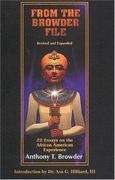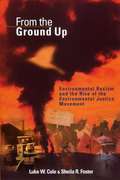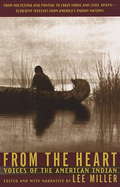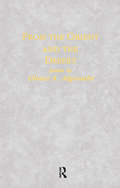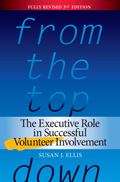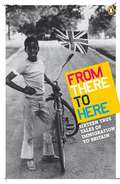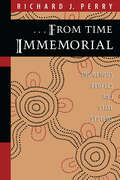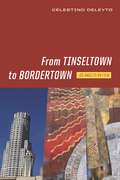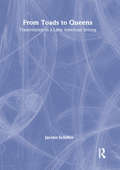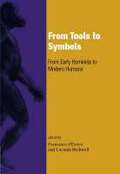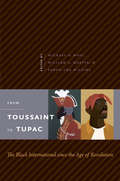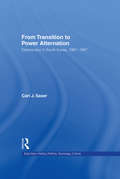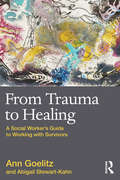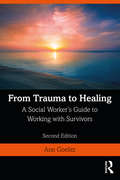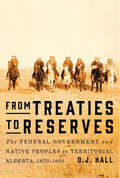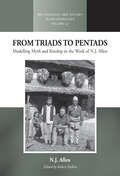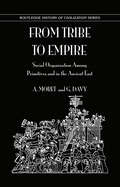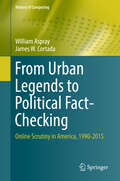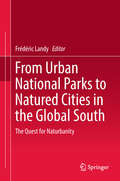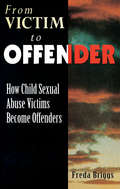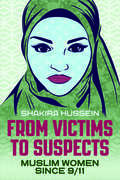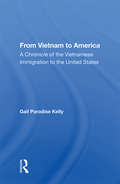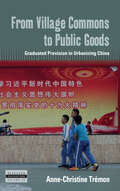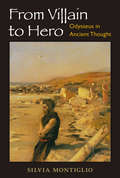- Table View
- List View
From The Browder File: 22 Essays On The African American Experience (From The Browder File)
by Asa Hilliard Anthony Browder Zelma Peterson Malcolm AaronFrom the Browder File: 22 Essays on the African American Experience
From The Ground Up: Environmental Racism and the Rise of the Environmental Justice Movement
by Luke W. Cole Sheila R. FosterWhen Bill Clinton signed an Executive Order on Environmental Justice in 1994, the phenomenon of environmental racism--the disproportionate impact of environmental hazards, particularly toxic waste dumps and polluting factories, on people of color and low-income communities--gained unprecedented recognition. Behind the President's signature, however, lies a remarkable tale of grassroots activism and political mobilization. Today, thousands of activists in hundreds of locales are fighting for their children, their communities, their quality of life, and their health. From the Ground Up critically examines one of the fastest growing social movements in the United States, the movement for environmental justice. Tracing the movement's roots, Luke Cole and Sheila Foster combine long-time activism with powerful storytelling to provide gripping case studies of communities across the U. S--towns like Kettleman City, California; Chester, Pennsylvania; and Dilkon, Arizona--and their struggles against corporate polluters. The authors effectively use social, economic and legal analysis to illustrate the historical and contemporary causes for environmental racism. Environmental justice struggles, they demonstrate, transform individuals, communities, institutions and even the nation as a whole.
From The Heart
by Lee MillerExcerpts from Native American speeches--by Moctezuma, Tecumseh, Cochise, Sitting Bull, and others--accompanied by commentary by non-Indian observers, provide an eloquent overview of five hundred years of fateful encounters between Europeans and Native Americans. Reprint. AB.
From The Orient & The Desert: Poems
by Ghazi A. AlgosaibiFirst Published in 1994. From the Orient and the Desert is a collection of fifteen poems from Ghazi A. Algosaibi. With pencil drawn illustrations by Andrew Vicari.
From The Top Down: The Executive Role In Successful Volunteer Involvement
by Susan J. EllisThe only book that addresses the senior decision-maker's role in developing a strategy and resources for high-quality volunteer engagement. It explains fundamental subjects that must be considered at the top executive level, including developing a vision for volunteer involvement, creating policies and setting expectations, budgeting and finding funds to support volunteers, hiring the best staff leader, assessing the impact of volunteer contributions, and dealing with legal, risk management, and insurance issues. The new 2010 edition includes information on managing volunteer involvement during an economic downturn, dealing with resistance by middle managers, the evolving vocabulary of volunteerism, new types of volunteering such as online service and voluntourism, the difference between a wage equivalency calculation and the true value of volunteers to an organization, and much more.
From There to Here: 16 True Tales of Immigration to Britain (The Decibel Penguin Prize #2)
by Toni Jackson Vesna Maric Ali Sheikholeslami Cosh Omar Menaka Raman Kirti Joshi Zlatko Pranjic Nimer Rashed Anita Sethi Xenia Crockett Nina Joshi Mimi Chan-Choong Cliff Walker Marek Kazmierski Jade Amoli-Jackson Charmaine JoshuaWe asked people from any background to send us their true personal accounts of immigration to Britain. The response was significant, and the range of entries overwhelming. Six judges - including Shami Chakrabarti of Liberty and the novelist Kate Mosse - selected the best, most illuminating and most powerful entries to be published in this book.The result is the widest-reaching contemporary survey of the immigrant experience published in many years. In these pages you'll discover sixteen very different voices, each one presenting a very different point of view. In taking us around the world, each account shows a new side to the most complicated journey of all, Finding a place to call home.'The country's ethnic and religious make-up is already making a vivid mark on our literature. I am proud and delighted to be its patron' David Lammy MP
From Time Immemorial: Indigenous Peoples and State Systems
by Richard J. PerryAround the globe, people who have lived in a place "from time immemorial" have found themselves confronted by and ultimately incorporated within larger state systems. During more than three decades of anthropological study of groups ranging from the Apache to the indigenous peoples of Kenya, Richard J. Perry has sought to understand this incorporation process and, more importantly, to identify the factors that drive it. This broadly synthetic and highly readable book chronicles his findings. Perry delves into the relations between state systems and indigenous peoples in Canada, the United States, Mexico, and Australia. His explorations show how, despite differing historical circumstances, encounters between these state systems and native peoples generally followed a similar pattern: invasion, genocide, displacement, assimilation, and finally some measure of apparent self-determination for the indigenous people--which may, however, have its own pitfalls. After establishing this common pattern, Perry tackles the harder question--why does it happen this way? Defining the state as a nexus of competing interest groups, Perry offers persuasive evidence that competition for resources is the crucial factor in conflicts between indigenous peoples and the powerful constituencies that drive state policies. These findings shed new light on a historical phenomenon that is too often studied in isolated instances. This book will thus be important reading for everyone seeking to understand the new contours of our postcolonial world.
From Time Immemorial: Indigenous Peoples and State Systems
by Richard J. PerryAround the globe, people who have lived in a place "from time immemorial" have found themselves confronted by and ultimately incorporated within larger state systems. During more than three decades of anthropological study of groups ranging from the Apache to the indigenous peoples of Kenya, Richard J. Perry has sought to understand this incorporation process and, more importantly, to identify the factors that drive it. This broadly synthetic and highly readable book chronicles his findings. Perry delves into the relations between state systems and indigenous peoples in Canada, the United States, Mexico, and Australia. His explorations show how, despite differing historical circumstances, encounters between these state systems and native peoples generally followed a similar pattern: invasion, genocide, displacement, assimilation, and finally some measure of apparent self-determination for the indigenous people—which may, however, have its own pitfalls. After establishing this common pattern, Perry tackles the harder question—why does it happen this way? Defining the state as a nexus of competing interest groups, Perry offers persuasive evidence that competition for resources is the crucial factor in conflicts between indigenous peoples and the powerful constituencies that drive state policies. These findings shed new light on a historical phenomenon that is too often studied in isolated instances. This book will thus be important reading for everyone seeking to understand the new contours of our postcolonial world.
From Tinseltown to Bordertown: Los Angeles on Film (Contemporary Approaches to Film and Media Series)
by Celestino DeleytoLos Angeles is a global metropolis whose history and social narrative is linked to one of its top exports: cinema. L.A. appears on screen more than almost any city since Hollywood and is home to the American film industry. Historically, conversations of social and racial homogeneity have dominated the construction of Los Angeles as a cosmopolitan city, with Hollywood films largely contributing to this image. At the same time, the city is also known for its steady immigration, social inequalities, and exclusionary urban practices, not dissimilar to any other borderland in the world. The Spanish names and sounds within the city are paradoxical in relation to the striking invisibility of its Hispanic residents at many economic, social, and political levels, given their vast numbers. Additionally, the impact of the 1992 Los Angeles riots left the city raw, yet brought about changing discourses and provided Hollywood with the opportunity to rebrand its hometown by projecting to the world a new image in which social uniformity is challenged by diversity. It is for this reason that author Celestino Deleyto decided to take a closer look at how the quintessential cinematic city contributes to the ongoing creation of its own representation on the screen. From Tinseltown to Bordertown: Los Angeles on Film starts from the theoretical premise that place matters. Deleyto sees film as predominantly a spatial system and argues that the space of film and the space of reality are closely intertwined in complex ways and that we should acknowledge the potential of cinema to intervene in the historical process of the construction of urban space, as well as its ability to record place. The author asks to what extent this is also the city that is being constructed by contemporary movies. From Tinseltown to Bordertown offers a unique combination of urban, cultural, and border theory, as well as the author’s direct observation and experience of the city’s social and human geography with close readings of a selection of films such as Falling Down, White Men Can’t Jump, and Collateral. Through these textual analyses, Deleyto tries to situate filmic narratives of Los Angeles within the city itself and find a sense of the “real place” in their fictional fabrications. While in a certain sense, Los Angeles movies continue to exist within the rather exclusive boundaries of Tinseltown, the special borderliness of the city is becoming more and more evident in cinematic stories. Deleyto’s monograph is a fascinating case study on one of the United States’ most enigmatic cities. Film scholars with an interest in history and place will appreciate this book.
From Toads to Queens: Transvestism in a Latin American Setting
by Jacobo SchifterThe information in From Toads to Queens: Transvestism in a Latin American Setting (a 2000 Lammy Nominee) is crucial to understanding Latin American culture and its relation to HIV prevention. You’ll find research findings that offer insights into and analysis of the sexual culture and risk factors that place transvestites in the sex trade and their customers at risk of contracting HIV. This information could prove valuable to developing preventions and interventions for similar populations in countries all over the world.In From Toads to Queens, transvestites in the sex trade and their customers share fascinating personal accounts from their daily lives, including details of their sexual encounters. Specifically you will gain insight into: sexual practices pay rates in the sex trade types of lovers and sexual partners locations of “work” conceptions of fashion and beauty among transvestites relations between transvestites, the police, and gay bashers clients who are heterosexual men drug consumption and unsafe sexFrom this book, you will gain a comprehensive analysis of Latin transvestites, how this population questions assumptions about sexual orientation and practice, and how they are affected by the HIV/AIDS epidemic. Most importantly, From Toads to Queens documents boundry-crossing individuals’existence and subverts the simplistic division of people into traditional psychiatric categories, a crucial first step in devising ways to decrease the rates of HIV infection among specific populations.
From Tools to Symbols: From Early Hominids to Modern Humans
by Francesco D’Errico & Lucinda BackwellA number of researchers have tried to characterise the anatomy and behavioural systems of early hominid and early modern human populations in an attempt to understand how we became what we are. Can archaeology, palaeo-anthropology and genetics tell us how and when human cultures developed the traits that make our societies different from those of our closest living relatives? In which cases are these differences substantial, and when do they simply reflect our definitions of culture, species, the image we have of their evolution or of ourselves? From Tools to Symbols, a collection of twenty-seven selected papers from a South African-French conference organised in honour of the well-known palaeo-anthropologist Phillip Tobias, provides a multidisciplinary overview of this field of study. It is based on collaborative research conducted in sub-Saharan Africa by South African, French, American and German scholars in the last twenty years, and represents an excellent synthesis of the palaeontological and archaeological evidence of the last five million years of human evolution.
From Toussaint To Tupac
by Michael O. West William G. Martin Fanon Che WilkinsTranscending geographic and cultural lines,From Toussaint to Tupacis an ambitious collection of essays exploring black internationalism and its implications for a black consciousness. At its core, black internationalism is a struggle against oppression, whether manifested in slavery, colonialism, or racism. The ten essays in this volume offer a comprehensive overview of the global movements that define black internationalism, from its origins in the colonial period to the present. From Toussaint to Tupacfocuses on three moments in global black history: the American and Haitian revolutions, the Garvey movement and the Communist International following World War I, and the Black Power movement of the late twentieth century. Contributors demonstrate how black internationalism emerged and influenced events in particular localities, how participants in the various struggles communicated across natural and man-made boundaries, and how the black international aided resistance on the local level, creating a collective consciousness. In sharp contrast to studies that confine Black Power to particular national locales, this volume demonstrates the global reach and resonance of the movement. The volume concludes with a discussion of hip hop, including its cultural and ideological antecedents in Black Power. Contributors: Hakim Adi, Middlesex University, London Sylvia R. Frey, Tulane University William G. Martin, Binghamton University Brian Meeks, University of the West Indies, Mona, Jamaica Marc D. Perry, University of Illinois, Urbana-Champaign Lara Putnam, University of Pittsburgh Vijay Prashad, Trinity College Robyn Spencer, Lehman College Robert T. Vinson, College of William and Mary Michael O. West, Binghamton University Fanon Che Wilkins, Doshisha University, Kyoto, Japan
From Transition to Power Alternation: Democracy in South Korea, 1987-1997 (East Asia: History, Politics, Sociology and Culture)
by Carl SaxerFirst Published in 2002. Routledge is an imprint of Taylor & Francis, an informa company.
From Trauma to Healing: A Social Worker's Guide to Working with Survivors
by Ann GoelitzFrom Trauma to Healing: A Social Worker’s Guide for Working With Survivors is the next significant publication on trauma in the field of social work. Since September 11 and Hurricane Katrina, social workers have come together increasingly to consider how traumatic events impact practice. From Trauma to Healing is designed to provide direction in this process, supporting both the field’s movement towards evidence-based practice and social workers’ growing need to be equipped to work with trauma. It does so in the practical-guide format already proven to be compelling to social work students, educators, and practitioners, providing case examples, and addressing social workers’ unique ecological approach.
From Trauma to Healing: A Social Worker's Guide to Working with Survivors
by Ann GoelitzThis updated edition of From Trauma to Healing is a comprehensive and practical guide to working with trauma survivors in the field of social work. Since September 11th and Hurricane Katrina, social workers have increasingly come together to consider how traumatic events impact practice. This text is designed to support the process, with a focus on evidence-based practice that ensures professionals are fully equipped to work with trauma. Highlights of this new edition include brand new chapters on practitioner bias and vulnerability, standardized assessment methodologies, and crisis management, as well as a focus on topics crucial to social workers such as Trauma Informed Care (TIC) and Adverse Childhood Events (ACES). The text also offers additional resources including chapter practice exercises and a sample trauma course syllabus for educators. With fresh examples and discussion questions to help deal with traumatic events in practice, including interventions that may be applicable to current and future 21st century world events, such as the coronavirus pandemic, From Trauma to Healing, 2nd edition remains an essential publication on trauma for students and social workers alike.
From Treaties to Reserves: The Federal Government and Native Peoples in Territorial Alberta, 1870-1924
by D.J. HallThough some believe that the Indian treaties of the 1870s achieved a unity of purpose between the Canadian government and First Nations, in From Treaties to Reserves D.J. Hall asserts that - as a result of profound cultural differences - each side interpreted the negotiations differently, leading to conflict and an acute sense of betrayal when neither group accomplished what the other had asked. Hall explores the original intentions behind the government's policies, illustrates their attempts at cooperation, and clarifies their actions. While the government believed that the Aboriginal peoples of what is now southern and central Alberta desired rapid change, the First Nations, in contrast, believed that the government was committed to supporting the preservation of their culture while they adapted to change. Government policies intended to motivate backfired, leading instead to poverty, starvation, and cultural restriction. Many policies were also culturally insensitive, revealing misconceptions of Aboriginal people as lazy and over-dependent on government rations. Yet the first two decades of reserve life still witnessed most First Nations people participating in reserve economies, many of the first generation of reserve-born children graduated from schools with some improved ability to cope with reserve life, and there was also more positive cooperation between government and First Nations people than is commonly acknowledged. The Indian treaties of the 1870s meant very different things to government officials and First Nations. Rethinking the interaction between the two groups, From Treaties to Reserves elucidates the complexities of this relationship.
From Triads to Pentads: Modelling Myth and Kinship in the Work of N.J. Allen (Methodology & History in Anthropology)
by N. J. Allen Robert ParkinN.J. (‘Nick’) Allen had an extensive academic career, which for the most part was spent in Oxford. He passed away in 2020. This edited volume brings together a selection of his anthropological papers. They cover two major fields and a supplementary one: Indo-European mythical comparison and his own notion of tetradic kinship, supplemented by a long-term interest in the work of Marcel Mauss and his uncle Émile Durkheim.It follows key areas of his research in which his contributions were novel, innovative, stimulating and plausible.
From Tribe To Empire: Social Organization Among The Primitives And In The Ancient East (G - Reference, Information And Interdisciplinary Subjects Ser.)
by MoretFirst published in 2005. Routledge is an imprint of Taylor & Francis, an informa company.
From Urban Legends to Political Fact-Checking: Online Scrutiny in America, 1990-2015 (History of Computing)
by William Aspray James W. CortadaThis text presents an historical examination of political fact-checking, highlighting how this is part of a larger phenomenon of online scrutiny that manifests itself in multiple forms. Reflecting the long history of “fake facts” in America, the book discusses important developments in this area from the emergence of the public Internet in the 1990s to the start of the Trump-Clinton presidential election campaigns.Topics and features: describes how some of the major players in political fact-checking began with the purpose of scrutinizing and debunking of urban legends; considers how this was part of a wider culture, encompassing B-grade horror movies, truth-or-fiction television shows, and groups warning about computer viruses; explains how such developments are connected, revealing political fact-checking as one of many forms of scrutiny applied in the face of a complex, dangerous world; provides a range of detailed case studies, covering such topics as the rumors surrounding the 9/11 terrorist attacks, and academic interest in contemporary legends; discusses how pre-Internet technologies such as bulletin boards, Usenet, and proprietary online service providers such as CompuServe and AOL were used to both disseminate and debunk urban legends; examines the rise of political fact-checking, reviewing all of the major initiatives in this area undertaken in the United States.This timely study touches on issues of popular culture and major events, and offers profiles of colorful individuals and organizations, and as such will appeal to a broad audience interested in the history of fact-checking and efforts to protect the political process from falsehoods.
From Urban National Parks to Natured Cities in the Global South: The Quest for Naturbanity
by Frédéric LandyThis important volume focuses on the sensitive issue of interrelationships between national parks situated near or within urban areas and their urban environment. It engages with both urban and conservation issues and and compares four national parks located in four large cities in the global South: Rio de Janeiro, Cape Town, Mumbai, and Nairobi. Though primarily undertaken as academic research, the project has intensively collaborated with the institutions in charge of these parks. The comparative structure of this volume is also original and unique: each of the chapters incorporates insight from all four sites as far as possible.The term “naturbanity” expresses the necessity for cities endowed with a national park to integrate it into their functioning. Conversely, such parks must take into account their location in an urban environment, both as a source of heavy pressures on nature and as a nexus of incentives to support their conservation. The principle of non-exclusivity, that is, neither the city nor the park has a right nor even the possibility to negate the other’s presence, summarizes the main argument of this book. Naturbanity thus blurs the old “modern” dichotomy of nature/culture: animals and human beings can often jump the physical and ideological walls separating many parks from the adjacent city. The 13 chapters and substantive introduction of this volume discuss various aspects of naturbanity: the histories of park creation; interaction between people and parks; urban governance and parks; urban conservation models; wildlife management; environmental education; and so on. This is a must-read for students and researchers interested in social ecology, social geography, conservation, urban planning and ecological policy.
From Victim to Offender: How child sexual abuse victims become offenders
by Freda BriggsTom was the only adult who gave me the attention and affection that I so badly needed. I loved his caresses and the times he comforted me. I loved talking to him because he was the only adult who listened and understood. - Neil's Story From Victim to Offender shows how victims of child sexual abuse become juvenile and adult offenders. The stories told by these offenders reveal the vulnerability of boys to paedophiles and pederasts who provide the male attention lacking in some children's home lives. They show how early sexualisation damages children's sexual development, their relationships and their adult lives. The story of a female offender reveals that this problem is not confined to boys. These stories highlight the inadequacy of current child protection programs for the protection of boys. The editor's introduction and the chapter from a psychologist who specialises in the treatment of offenders emphasise the need to improve child protection and treatment programs for offenders.From Victim to Offender offers unique insights into the experiences of victims and offenders of sexual abuse, and is essential reading for professionals who are concerned about child protection and those responsible for the rehabilitation of offenders.
From Victims to Suspects: Muslim Women Since 9/11
by Shakira HusseinDrawing on interviews and examples from across the globe, this book tackles the shifting narratives surrounding Muslim women Once regarded as passive victims waiting to be rescued, Muslim women are now widely regarded as arbiters of "terror" and a potential threat to be kept under control. Drawing on interviews and examples from around the world including Afghanistan, Pakistan, Europe, and North America, Shakira Hussein shows how this shift in attitude has taken place and how it impacts feminism, multiculturalism, race, and religion on a global scale. She argues that alongside the fear of Islamic terrorism is a growing fear of Islam as a cultural hazard that is undermining Western society from within. Muslim women, the transmitters of cultural practices, are frequently seen to play a key role in this. Hussein’s work makes for a compelling read, offering a unique perspective on what it means to be a Muslim woman post-9/11.
From Vietnam To America
by Gail Paradise KellyIn late April 1975 the war that raged in Vietnam for decades came to an end as the American-backed government of South Vietnam collapsed. Out of the territories that had once been French Indochina came over 200,000 Cambodian, Laotian, and Vietnamese refugees fleeing by plane, by boat, or on foot. Some left under U.S. government auspices; others setout on their own. This book is a chronicle of the 1975 flight of Vietnamese from their country. It traces the departure from Vietnam and the resettlement of 130,000 of these refugees in the United States and focuses on the process by which Vietnamese went from refugees to immigrants.
From Village Commons to Public Goods: Graduated Provision in Urbanizing China (Dislocations #34)
by Anne-Christine TrémonIlluminating the complex processes of China’s uneven urbanization through the lens of the transition from village commons to public goods, this book is set in three urbanized villages in Shenzhen, Chengdu, and Xi’an, which have experienced similar demographic explosions and dramatic changes to their landscapes, the livelihoods of its inhabitants, and the power structures governing their residents. Graduated provision is the delivery of public goods informed by the teleological ideology of urbanization, and by neoliberalism with Chinese characteristics, and has been employed as an answer to the challenges of making public goods, such as welfare provisions, public parks, education, and senior care, equally accessible to all in recently urbanized communities.
From Villain to Hero: Odysseus in Ancient Thought
by Silvia MontiglioPraise for Silvia Montiglio "[A] brilliant and important book. . . . " ---Journal of Religion,onSilence in the Land of Logos "[A]n invigorating reevaluation of both the ancient symbolic landscape and our preconceptions of it. " ---American Journal of Philology, onWandering in Ancient Greek Culture Best known for his adventures during his homeward journey as narrated in Homer's Odyssey, Odysseus remained a major figure and a source of inspiration in later literature, from Greek tragedy to Dante's Inferno to Joyce's Ulysses. Less commonly known, but equally interesting, are Odysseus' "wanderings" in ancient philosophy: Odysseus becomes a model of wisdom for Socrates and his followers, Cynics and Stoics, as well as for later Platonic thinkers. From Villain to Hero: Odysseus in Ancient Thoughtfollows these wanderings in the world of ancient Greek and Roman philosophy, retracing the steps that led the cunning hero of Homeric epic and the villain of Attic tragedy to become a paradigm of the wise man. From Villain to Heroexplores the reception of Odysseus in philosophy, a subject that so far has been treated only in tangential or limited ways. Diverging from previous studies, Montiglio outlines the philosophers' Odysseus across the spectrum, from the Socratics to the Middle Platonists. By the early centuries CE, Odysseus' credentials as a wise man are firmly established, and the start of Odysseus' rehabilitation by philosophers challenges current perceptions of him as a villain. More than merely a study in ancient philosophy, From Villain to Hero seeks to understand the articulations between philosophical readings of Odysseus and nonphilosophical ones, with an eye to the larger cultural contexts of both. While this book is the work of a classicist, it will also be of interest to students of philosophy, comparative literature, and reception studies.
